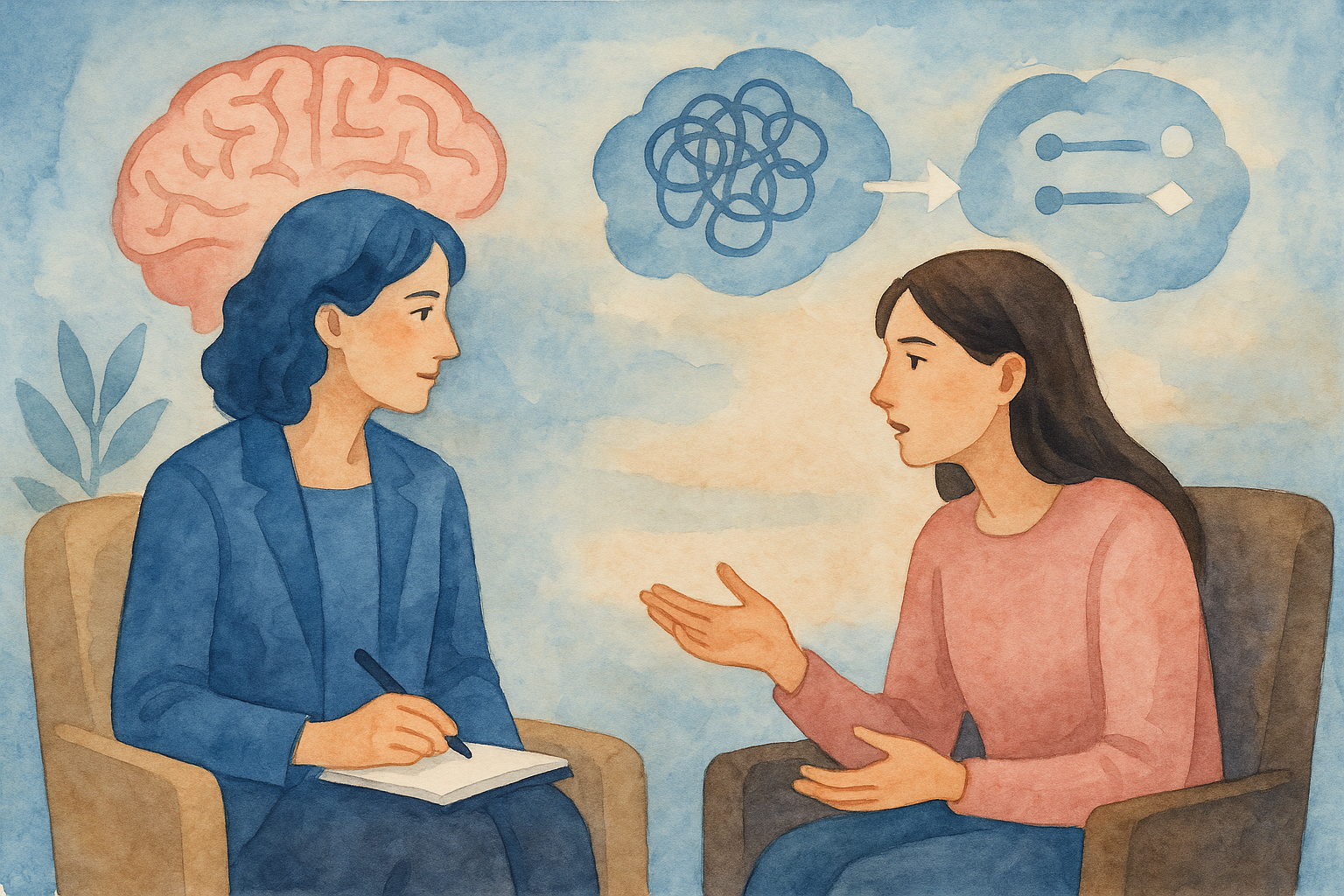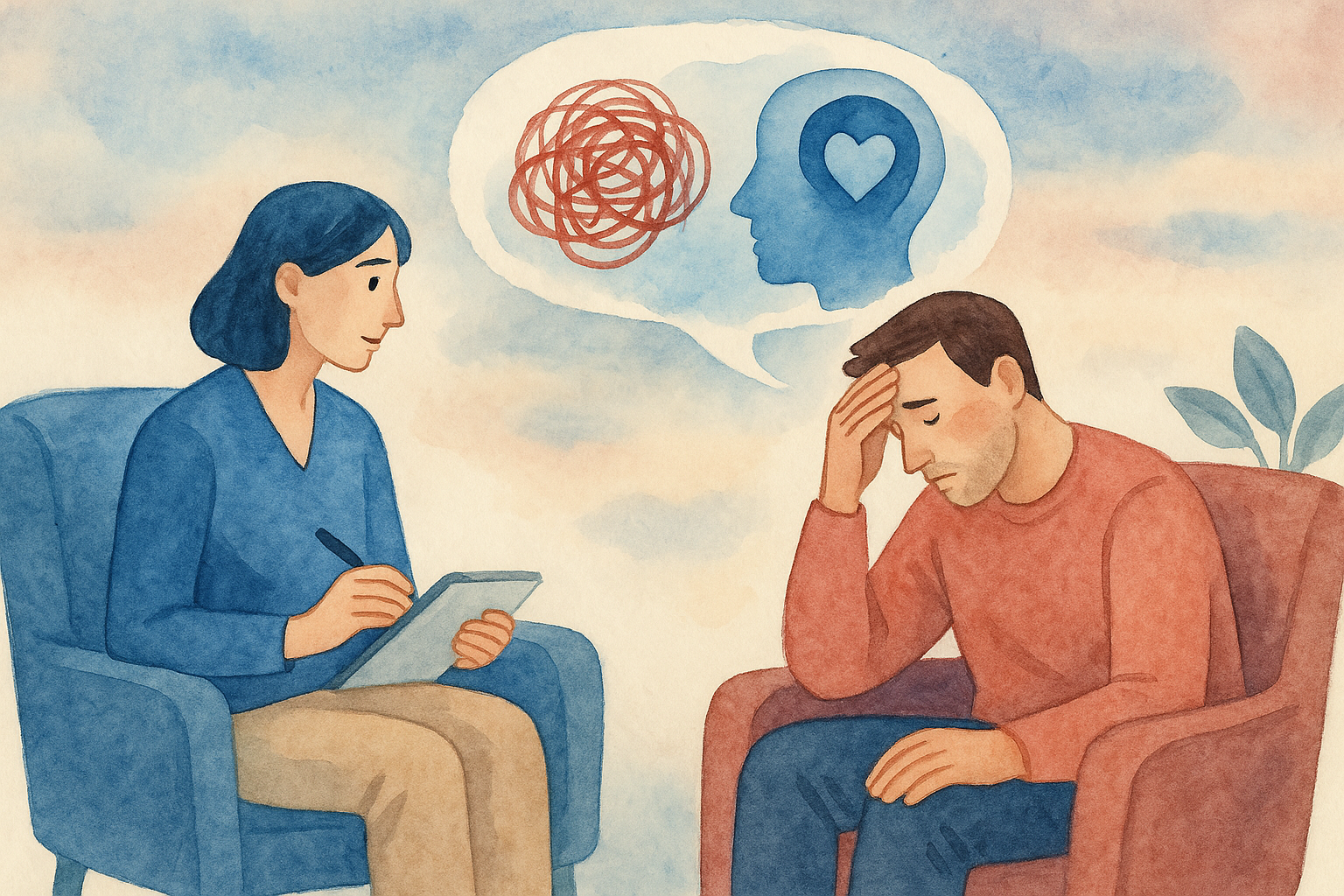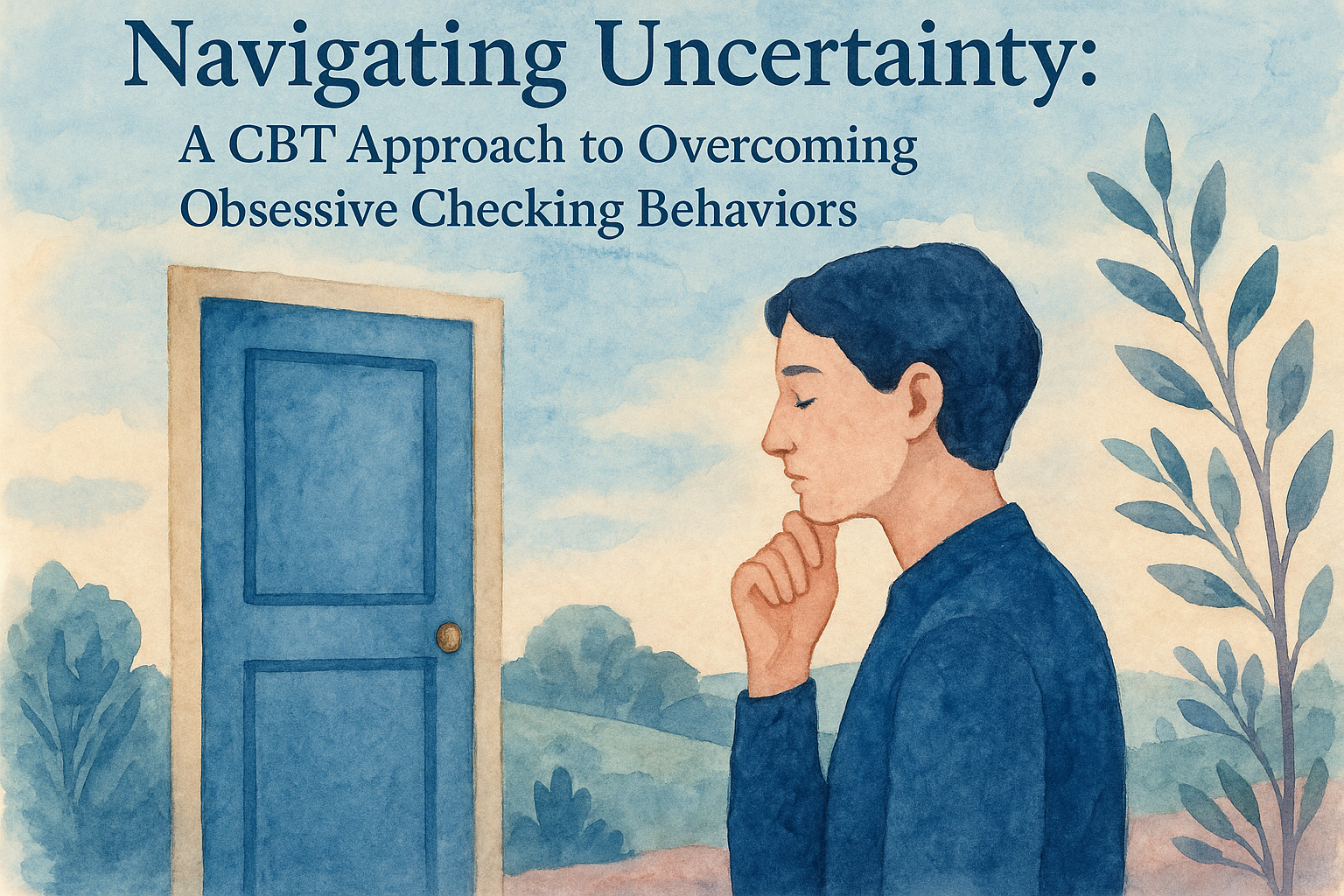Obsessive-compulsive disorder (OCD) can significantly affect the elderly, often manifesting through persistent obsessions and compulsions that influence daily life. This article explores a cognitive-behavioral therapy (CBT) approach that emphasizes understanding and reshaping maladaptive beliefs, helping older adults manage their OCD more effectively and enhance their overall mental well-being.
Understanding OCD and Its Impact on the Elderly
Obsessive-Compulsive Disorder (OCD) manifests uniquely in elderly individuals, often compounding the challenges of aging. As older adults navigate the complexities of later life, the nature of their obsessions and compulsions can reflect the fears and vulnerabilities associated with this stage. Common themes of OCD such as contamination fears, a need for order, and repetitive checking behaviors can take on new meanings and intensities in senior populations.
For instance, an elderly individual may develop a heightened fear of contamination due to age-associated health concerns. A simple act of using public transportation may trigger obsessions about germs, leading to compulsive handwashing or avoidance of social interactions that could threaten their perceived safety. The compulsive behaviors can provide a temporary respite from anxiety but may inadvertently isolate the individual further, exacerbating feelings of loneliness and despair.
Another prevalent theme in the elderly experience of OCD is the need for order. An older adult may feel compelled to arrange their living space in a specific way to alleviate anxiety. This need for order can manifest through repetitive behaviors, such as constantly rearranging items on a table or strictly adhering to a particular routine. While such actions may offer a sense of control, the rigidity of these compulsions can detract from their quality of life, limiting their engagement in spontaneous activities that could enhance social connections and emotional fulfillment.
Repetitive checking behaviors are also common among older adults with OCD. An individual might repeatedly check that doors are locked or appliances are turned off, driven by an overwhelming fear of danger. This incessant checking can be exacerbated by cognitive decline, as memory lapses may fuel uncertainties regarding their own safety. As aging progresses, the merging of memory issues with existing obsessions can create a vicious cycle, leading to increased anxiety and exacerbating the compulsive behaviors intended to alleviate it.
An essential aspect of managing OCD in seniors is the importance of comprehensive diagnosis and individualized treatment plans. Many elderly individuals may not be diagnosed with OCD until later in life, often because their symptoms are mistaken for normal age-related changes or other mental health disorders. Misdiagnosis can delay appropriate treatment, meaning that symptoms may worsen over time. For instance, if an elderly person is perceived to be merely forgetful or anxious due to aging, their compulsive behaviors might go unaddressed, prolonging suffering and impairment in daily functioning.
Proper diagnosis necessitates the involvement of professionals who understand the complexities of OCD, particularly in older populations. Identifying subtle variations of standard symptoms—such as increased compulsive behaviors due to cognitive decline—can lead to more effective treatment recommendations. These plans often include a combination of medications, such as SSRIs, and various therapeutic approaches tailored to the individual’s life circumstances and preferences.
Real-life examples can illustrate the critical nature of receiving a proper diagnosis. For instance, consider a 75-year-old woman who is persistently haunted by the thought that her grandchildren will become ill if she does not wash her hands obsessively. This fear was overlooked for months until her family sought help from a mental health professional, who recognized the need for intervention. Through a tailored treatment plan, which included exposure and response prevention therapy, the elderly woman was able to gradually face her fears and reduce her compulsive handwashing, thus reclaiming her ability to engage with her family in meaningful ways.
In conclusion, understanding OCD and its unique presentation in the elderly is vital in order to alleviate the distress and enhance the quality of life for this population. Recognizing the influence of age-related factors on obsessions and compulsions, alongside the importance of accurate diagnosis and effective intervention strategies, can pave the way for resilience and improved emotional well-being in elderly individuals facing the challenges of OCD.
The Cognitive-Behavioral Therapy Approach: Mapping Maladaptive Beliefs
Cognitive-Behavioral Therapy (CBT) serves as a pivotal approach in managing obsessive-compulsive disorder (OCD) among elderly individuals, particularly through the identification and restructuring of maladaptive beliefs. The effectiveness of CBT lies in its systematic approach to understanding how entrenched thought patterns contribute to obsessive thoughts and compulsive behaviors. For seniors, who may be grappling with age-related challenges such as health deterioration, isolation, or cognitive decline, managing these thoughts becomes essential for improving their quality of life.
At the heart of CBT is the principle that our thoughts significantly influence our feelings and behaviors. Elderly individuals with OCD often hold unhelpful beliefs that exacerbate their obsessions. For instance, a senior struggling with contamination fears may believe that touching a doorknob without hand sanitizer will inevitably lead to illness. This belief not only elevates anxiety but also compels them to engage in excessive handwashing, creating a cycle that is difficult to break. Through CBT, therapists help clients identify these thoughts, understand their impact, and challenge their validity.
One compelling case study involves Margaret, a 72-year-old widow who developed severe cleaning obsessions following her husband’s death. Initially, she devoted several hours each day to cleaning her home, convinced that any speck of dust was a threat to her health. During CBT sessions, Margaret and her therapist worked collaboratively to map her maladaptive beliefs. They dissected her thoughts, identifying phrases like “If I don’t clean perfectly, I will get sick” as rooted in exaggerated fears. By employing cognitive restructuring techniques, Margaret learned to reframe this belief to “I can clean enough to keep my home safe without doing it obsessively.” This shift not only reduced her cleaning time but also diminished her anxiety, illustrating the transformative effects of cognitive restructuring.
Another effective method within CBT is exposure and response prevention (ERP), where individuals face their fears in a controlled manner while refraining from engaging in their compulsive behaviors. Jacob, an 80-year-old man with checking rituals, epitomizes this approach. He would check his stove multiple times before leaving home, driven by the obsessive thought that he would cause a fire. Through CBT, Jacob was gradually exposed to real-life situations where he had to leave his home without performing his usual checks. Each successful outing without checking solidified the belief that he could withstand the anxiety of not checking. With ongoing support and reinforcement of his cognitive shifts, Jacob gained confidence in his ability to manage his OCD.
CBT for seniors also emphasizes the significance of monitoring and challenging unhelpful beliefs in daily life. Therapists often equip clients with cognitive journals, encouraging them to document obsessive thoughts and the accompanying compulsions. This practice fosters an awareness of the patterns that trigger their OCD and aids in the identification of automatic thoughts. The process allows elderly individuals to observe their cognitive distortions and evaluate whether their fears are justified, facilitating personal insight and skill development.
In addition to cognitive restructuring and the ERP model, promoting adaptive thinking patterns is central to CBT’s success. Seniors are taught to assess the evidence supporting their beliefs critically and to generate alternative, more balanced perspectives. This process not only reduces the power of obsessions but also bolsters emotional regulation. When confronted with distressing thoughts, seniors equipped with adaptive skills can replace negative self-talk with affirmations like, “I am capable of handling uncertainty” or “An imperfect home doesn’t mean I am failing.”
The journey through CBT offers elderly individuals a framework for understanding and managing OCD over time. By fostering resilience through cognitive restructuring, they can reshape their thought patterns, ultimately enhancing their well-being and coping strategies. The empowering nature of this therapeutic approach demonstrates that with the right guidance and techniques, seniors can reclaim their lives from the grips of OCD, leading to a more fulfilling and balanced existence.
Building Resilience Through Flexible Thinking
The journey toward resilience in elderly individuals with OCD is multifaceted, requiring an emphasis on fostering flexibility in thinking. As they navigate the complexities of late adulthood, seniors can often feel trapped within rigid thought patterns that exacerbate their obsessions. Cognitive-behavioral therapy (CBT) underscores the significance of recognizing these unyielding beliefs and replacing them with more adaptive, flexible thought processes. This transition is crucial for managing OCD and enhancing overall quality of life.
Elderly individuals frequently grapple with obsessions that may stem from a lifetime of experiences, fears, and anxiety rooted in age-related changes. This can manifest in areas such as health fears, safety concerns, or perfectionistic tendencies regarding their routines. For instance, an 80-year-old woman named Margaret found herself obsessively checking her locks multiple times each night, driven by an overwhelming fear that intruders might break in. Her rigidity in thinking led her to ignore evidence that her neighborhood was safe, which contributed to her distress.
Practical strategies for fostering flexibility in thinking can include cognitive restructuring exercises. These exercises encourage seniors to challenge their obsessive thoughts directly. For instance:
1. **Thought Journaling**: Encourage seniors to maintain a journal where they record their obsessive thoughts, the circumstances surrounding them, and the feelings that arise. This not only helps in identifying patterns but also promotes self-reflection.
2. **Alternative Thinking Techniques**: Introduce the “What’s the Worst That Could Happen?” exercise. Ask seniors to articulate their obsessive thoughts, followed by brainstorming the most extreme outcomes. Afterward, they can evaluate the likelihood of these scenarios occurring, often realizing that they are far less probable than their obsessiveness suggests.
3. **Behavioral Experiments**: Guide seniors to engage in small experiments that challenge their obsessions. For example, they might leave their door unlocked for a brief period while they sit nearby, allowing them to experience the reality of their fears without reinforcing their compulsion to check repeatedly.
4. **Mindfulness Practices**: Mindfulness techniques can help seniors develop awareness of their thoughts while fostering a non-judgmental attitude toward them. Simple breathing exercises or guided imagery can cultivate a sense of calm, assisting them in observing thoughts without immediate reaction.
These strategies can significantly help in breaking the cycle of obsession and compulsion, paving the way for adaptive thinking. Success stories abound; for example, Ed, a 75-year-old man, struggled for years with obsessive doubts about health. Through CBT’s techniques, he began to recognize when his thoughts spiraled into catastrophizing. By incorporating alternative thinking techniques, he reframed his health anxieties into manageable, realistic concerns, ultimately regaining tranquility and agency in his life.
Moreover, encouraging social support can bolster resilience among seniors with OCD. Group therapy sessions, where individuals share experiences and strategies, can enhance feelings of belonging and understanding. This camaraderie cultivates an environment where flexible thinking flourishes, reinforcing the belief that they are not alone in their struggles.
Another empowering strategy is the practice of gratitude. Encouraging seniors to list daily achievements or moments of appreciation can shift focus from obsessive thoughts to positive experiences, reinforcing adaptive patterns of thinking. This practice builds resilience by allowing seniors to connect emotionally with sources of joy and accomplishment, rather than being bogged down by their fears.
As elderly individuals continue their journey with OCD, the shift from rigid to flexible thinking not only alleviates symptoms but also enhances overall resilience. CBT, with its transformative approach, empowers seniors to confront, negotiate, and ultimately reshape their thought patterns. Each success, no matter how small, contributes to a cumulative sense of achievement, fostering an optimistic outlook on the future and enabling a vital resource: the power to redefine their relationship with their obsessions.
Conclusions
As the elderly face unique challenges with OCD, employing a cognitive-first approach can transform their quality of life. By fostering flexibility in thinking patterns and addressing maladaptive beliefs, seniors can cultivate resilience, reduce symptoms, and improve mental well-being. This empathetic method highlights the importance of understanding one’s thoughts and feelings to achieve lasting change.











